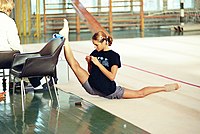
Photo from wikipedia
Abstract Zenko, Ekkekakis, and Ariely (2016) showed that participants whose exercise session became progressively easier over time showed more positive affect than participants whose session became increasingly more difficult. The… Click to show full abstract
Abstract Zenko, Ekkekakis, and Ariely (2016) showed that participants whose exercise session became progressively easier over time showed more positive affect than participants whose session became increasingly more difficult. The current study examined whether Zenko et al.’s decrease in exertion-increase in feeling state relationship held in a series of three, unmanipulated practices among a sample of collegiate athletes. In addition, change in feelings of accomplishment was included as a predictor of overall after-practice feeling state and as a potential mediator of the relationship between change in exertion and change in feeling state during practice in multilevel models. Results showed the relationship between change in exertion and change in feeling state was negative but did not consistently reach significance, and change in feeling state did not consistently predict overall feeling state after practice. However, increase in accomplishment was a significant predictor of overall feeling state after practice, and change in accomplishment was a significant mediator of the relationship between change in exertion and change in feeling state. Increase in exertion can lead to an increase in positive feeling states when trying harder leads to an increase in feelings of accomplishment during practice settings despite a direct effect sometimes showing increase in exertion leads to a decrease in feeling states. These results demonstrate an inconsistent mediator effect and provide insight into how athletes may be able to feel better while working harder, not worse.
Journal Title: Psychology of Sport and Exercise
Year Published: 2020
Link to full text (if available)
Share on Social Media: Sign Up to like & get
recommendations!